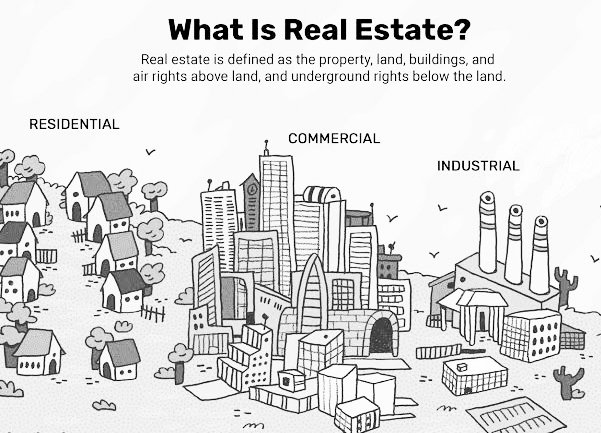Deep Dive: What is Real Estate and How Does it Work
Are you interested in real-estate and you don’t know how the industry works? In this article l’ll explain on what is real estate, types of real estate and how it works.

Real estate is the property, land, buildings and air rights above land and underground rights below the land therefore when we use the term real estate it means real or physical property. Real estate investment refers to buying, producing and selling real estate.
The word “Real” comes from Latin word “rex” meaning “royal” since kings used to own all the land in their realms.
Real estate plays a core role in an economy since it contributes to the growth of the economy of any country that is why real estate is a unique business to venture in and also amazing in terms of cash when invested well.
Categories of Real Estate
There are several types of real estate, each with unique purpose and utility but the main categories include:
- Land
- Commercial
- Industrial
- Residential
- Land
Land is the corner stone of all types of real estate. This includes vacant land, working farms and ranches. Vacant land has subcategories such as undeveloped land, early development, reuse.
It can be acquired by investors or real estate agencies then develop it by combining other properties they can increase the value of the property.
- Commercial
Commercial real estate refers to land and buildings that are used by businesses to carry out their operations. Examples: Shopping centers, malls, medical and educational buildings, hotels and offices.
Apartments also are usually considered as an example of commercial real estate because they are owned to generate income.
- Industrial
Industrial real estate refers to land and buildings that are used by industrial businesses for their day to day activities. It includes manufacturing buildings and property as well as warehouses. The buildings can be used for research, production, storage and distribution of goods.
- Residential
Residential real estate consists of housing for individuals, families, groups of people. This is the most common among the categories of real estate business and its what people are familiar with.
Examples include: single-family homes, triple-deckers, vacation homes, townhouses, high-value homes, duplexes.
How does real estate industry work?
In this section of the article we are to explore on how the real estate business works. It can be divided into six different major areas:
- Development
- Sales and marketing
- Brokerage
- Property management
- Lending
- Professional services
- Development
This is a process in real estate that involves the purchase of land, construction, renovating if old or broken and selling the finished product to end users.
In return the developers who can be investors add value of the land through the building or any good improvement made.
Doing this development firms create new products, which can be thought of as ‘‘primary market’’.
- Sales and marketing
In real estate the sales and marketing firms are involved in selling now the buildings and units created by development firms.
These firms use their sales agents to sell and in return earn a commission for that. Usually they focus on new units.
- Brokerage
Brokerage firms in real estate are firms that employ realtors to facilitate transaction between buyers and sellers of property. Their job is to represent either the buyer or seller to achieve a sale with the best possible terms.
- Property Management
Property management firms help real estate owners rent out their units. They are resposible for:
- Rent collection
- Perform repairs
- Fixing deficiencies
- Managing tenants
The firms in return charge the owners a fee for the services performed.
- Real estate lending
To invest in real estate you need money if you have less money to make a purchase lenders play a role of lending money. Examples of lenders are: Banks, credit unions, private lenders and government institutions.
- Professional services
Real estate has professionals who work to make it function efficiently. They can include lawyers, accountants, construction workers, contractors, interior designers and many others.


























![7 Famous Architectures in Africa [PHOTOS]](https://realestateblogpost.com/uploads/images/2023/05/image_380x226_646c9c2bd8642.jpg)






